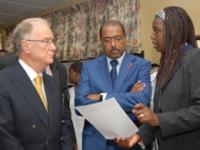
(L to R): Dr Jorge Sampaio, UN Secretary General’s Special Envoy to Stop TB, UNAIDS Executive Director Michel Sidibé and Dr Anita, Asiimwe, Executive Secretary of the National AIDS Control Comission during a visit to the Centre Medical Social de Kiryogo near Kigali, Rwanda on 1 September 2009. Credit: UNAIDS/L.Rusanganwa
Dr Jorge Sampaio, the UN Secretary General’s Special Envoy to Stop TB and UNAIDS Executive Director Michel Sidibé together witnessed, first-hand, delivery of integrated HIV and TB services during a visit to the Socio-Medical Centre in Biryogo.
"It is gratifying to be at this clinic, which has intensified TB case finding in people living with HIV through TB screening and transferring confirmed cases to a TB clinic. In addition patients who enrol at the health centre with tuberculosis are also tested for HIV and those found to be HIV positive are given integrated care and support. It is a programme that reflects Rwanda's impressive progress nationwide on coordinating TB and HIV services," said Dr Jorge Sampaio, the UN Secretary-General's Special Envoy to Stop TB.
Mr Sidibé highlighted the progress Rwanda has made in improving the outcome of TB and HIV co-infection through better collaboration and the use of innovative diagnostic technology and underlined the UN’s commitment to effectively tackling the dual epidemics.
I am pleased to see that Rwanda is leading Africa and the world in taking an integrated approach to dealing with the interlinked epidemics of TB and HIV. Rwanda’s bold leadership is achieving impressive results that show the rest of Africa what can be achieved.
UNAIDS Executive Director Michel Sidibé
“I am pleased to see that Rwanda is leading Africa and the world in taking an integrated approach to dealing with the interlinked epidemics of TB and HIV. Rwanda’s bold leadership is achieving impressive results that show the rest of Africa what can be achieved," said Mr Sidibé said.
Mr Sidibé emphasize that tackling TB and HIV jointly is a priority for UNAIDS and, as stated in the UNAIDS Outcome Framework 2009-2011, it is one of the nine key areas for achieving results with the final goal being that no person living with HIV should die of TB.
Dr Sampaio and Mr Sidibé proceeded to another joint visit to Rwanda's National Reference Laboratory in Kigali, where they saw evidence of the country's major investment in laboratory services.

(L to R): UN Resident Coordinator, Aurélien Agbénonci, Dr Jorge Sampaio, United Nations Secretary General Special Envoy for Tuberculosis and UNAIDS Executive Director, Michel Sidibé visiting the Centre Medical Social de Kiryogo near Kigali, Rwanda on 1 September 2009. Credit: UNAIDS/L.Rusanganwa
Rwanda has been tackling a thorny issue -- the difficulty of diagnosing TB among people living with HIV. TB diagnosis requires visualization under a microscope of the bacteria that cause the disease, obtained via sputum samples. Among people living with HIV, often few bacteria are present in the sputum and they are therefore not detectable through conventional diagnosis, even if the person has serious TB disease. Consequently the diagnosis is often missed.
The sensitivity of a TB diagnosis can be improved by incubating the samples to multiply the TB bacteria; but this process can take weeks or even months using conventional methods. To increase speed and accuracy of TB diagnosis, fast liquid culture (MGIT) will be introduced and rolled out soon in Rwanda. The National Reference Laboratory is also studying more efficient microscopes and staining techniques to improve speed of TB diagnosis.
Since 2004 Rwanda has had the capacity to test for drug-resistant TB. The National Reference Laboratory and the other main laboratories in the country are also currently developing their capacity to diagnose cases of XDR-TB (although none have been detected in Rwanda to date).
Dr Sampaio and Mr Sidibé congratulated the laboratory staff on their excellent work and recognized the key role they play in reducing deaths from TB among people living with HIV.
They highlighted the need for much greater investment in strengthening laboratory services and committed to advocating for increased investment in research for a faster, simpler and more accurate TB test.





